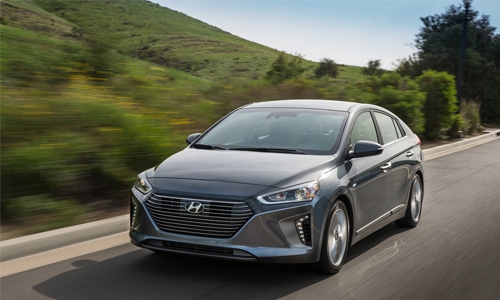Hyundai confirms IONIQ Hybrid launch
Manama : Hyundai plans to begin Middle East deliveries of its ground-breaking IONIQ range of alternative-fuel cars before the end of 2016, following the official global sales launch in July.
First presented at the Geneva Motor Show in March, IONIQ is the first production Hyundai engineered from the ground up as a platform for alternative drivetrains. Rather than settle for one drivetrain, a shared vehicle architecture will accommodate a choice of three of the most trusted alternative-fuel technologies currently available: hybrid, plug-in hybrid, or full electric.
Deliveries of the hybrid and full electric will begin in selected Africa and Middle East markets in the latter part of 2016, beginning with the GCC region, with the main focus being on the hybrid model.
“The IONIQ is the first car to recognise that there is more than one way forward. It offers a selection of three proven technologies to meet the needs of different customers and markets, rather than pushing consumers towards a single design,” said Mike Song, Head of Operations for Hyundai Africa and Middle East.
The two hybrid IONIQs both feature Hyundai’s 1.6 litre Kappa GDI petrol engine, tailored to the hybrid application. In the full hybrid, the petrol engine is mated to a 32 kW electric motor, the system delivering a combined 103.6 kW of power and up to 265 Nm of torque, while a 1.56 kWh lithium-ion-polymer battery positioned under the rears seats enables pure electric driving and delivers instant torque. Targeted CO2 emission is 79 g/km for the full hybrid.
The full electric model dispenses with the petrol engine, and offers a 28 kWh battery for an estimated 250km range before it needs recharging. Power is lower than for the hybrids at 88 kW, but torque is higher at 295 Nm. Emissions are zero at the tailpipe, with the overall figure depending on the electricity supply used for recharging.
Full electric batteries can be recharged from a standard household socket, and Hyundai has also unveiled a fast charger that can top up the battery to 80 per cent in about 20 minutes.
“In the GCC in particular we are seeing high levels of official support for electric vehicles, which is part of a wider push in the region to use renewable energy,” said Mike Song. “Full electric vehicles can add value to investments being made in solar power, where recharging during daylight hours using renewable energy can create true zero-emissions motoring.”
The IONIQ is part of Hyundai’s ambitious strategy to bring alternative fuels to everyday motoring, and follows international launches of the Sonata Hybrid, available in selected markets since 2011, and the Tucson Fuel Cell, which is the world’s first mass-production vehicle to use a hydrogen fuel cell for energy storage.
Related Posts

